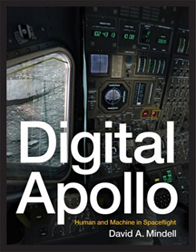Please join authors@mit and the Humanities Library in celebrating the publication of Digital Apollo, the newest book by MIT’s David Mindell. “Digital Apollo” tells the story of how human pilots and automated systems worked together to achieve the ultimate in flight—the lunar landings of NASA’s Apollo program.
“Digital Apollo is an excellent and unique historical account of the lengthy and often pitched struggle of designers, engineers, and pilots to successfully integrate man and complex computer systems for the Apollo lunar landings. It brings back fond memories.”
—Edgar Mitchell, Sc.D.; Captain, USN (retired) Lunar Module Pilot, Apollo 14
About the book:
As Apollo 11’s Lunar Module descended toward the moon under automatic control, a program alarm in the guidance computer’s software nearly caused a mission abort. Neil Armstrong responded by switching off the automatic mode and taking direct control. He stopped monitoring the computer and began flying the spacecraft, relying on skill to land it and earning praise for a triumph of human over machine.
In “Digital Apollo”, engineer-historian David Mindell takes this famous moment as a starting point for an exploration of the relationship between humans and computers in the Apollo program. In each of the six Apollo landings, the astronaut in command seized control from the computer and landed with his hand on the stick. Mindell recounts the story of astronauts’ desire to control their spacecraft in parallel with the history of the Apollo Guidance Computer. From the early days of aviation through the birth of spaceflight, test pilots and astronauts sought to be more than “spam in a can” despite the automatic controls, digital computers, and software developed by engineers. Digital Apollo examines the design and execution of each of the six Apollo moon landings, drawing on transcripts and data telemetry from the flights, astronaut interviews, and NASA’s extensive archives.
Mindell’s exploration of how human pilots and automated systems worked together to achieve the ultimate in flight–a lunar landing–traces and reframes the debate over the future of humans and automation in space. The results have implications for any venture in which human roles seem threatened by automated systems, whether it is the work at our desktops or the future of exploration.
“Digital Apollo” is published by the MIT Press, 2008.
Visit the Digital Apollo website for more information about the book!
David A. Mindell is Dibner Professor of the History of Engineering and Manufacturing, Professor of Engineering Systems, and Director of the Program in Science, Technology, and Society at MIT. He is the author of “Between Human and Machine: Feedback, Control, and Computing before Cybernetics” and “War, Technology, and Experience aboard the USS Monitor.”
Where: MIT 32-155, Stata Center
When: Thursday November 13th, 6:00pm
The event is free and wheelchair accessible.
For more information, call call 253-5249, or email authors@mit.edu. See the MIT Press Bookstore’s “Events” page for a list of upcoming events.


